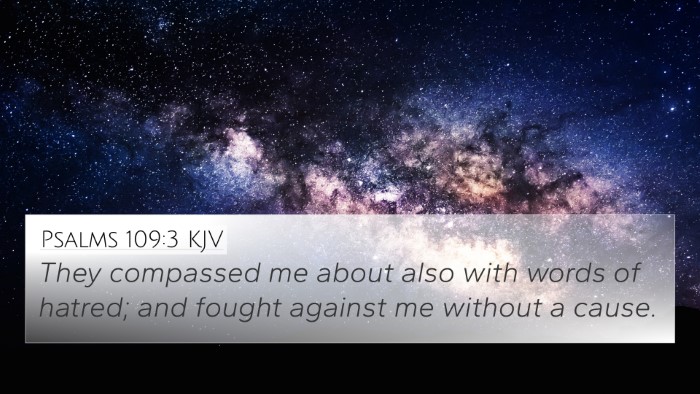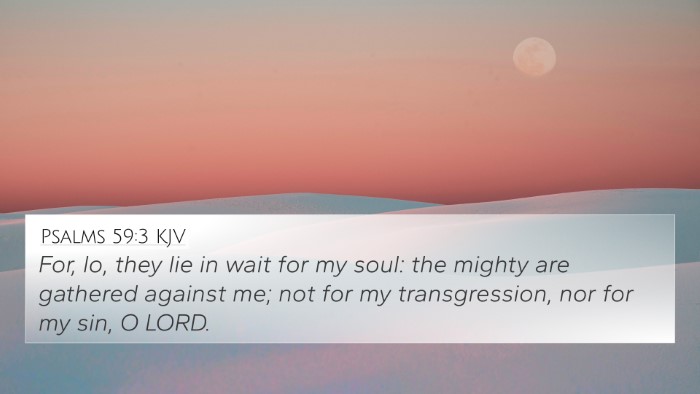Psalms 69:4 - Summary and Commentary
Psalms 69:4 states, "They that hate me without a cause are more than the hairs of my head: they that would destroy me, being mine enemies wrongfully, are mighty: then I restored that which I took not away." This verse captures the anguish of the psalmist, expressing feelings of betrayal and deep distress due to unjust persecution.
General Overview
This verse portrays a situation where the psalmist, often identified as David, is surrounded by enemies who hate him without justifiable reasons. He highlights the overwhelming nature of their hatred, juxtaposing it against a metaphorical count of the hairs on his head—indicating how numerous and fierce his adversaries are.
Detailed Commentary Insights
-
Matthew Henry's Commentary:
Matthew Henry emphasizes the idea of innocent suffering, noting that the psalmist's enemies are numerous and relentless. He points out that this verse reflects the reality of the righteous being persecuted despite their innocence. The comparison to the hairs on the head serves to magnify the overwhelming nature of this hostility. Henry sees a foreshadowing of Christ's own unjust suffering and rejection, connecting the pain of David to the greater narrative of scripture.
-
Albert Barnes' Notes:
Albert Barnes interprets this verse by focusing on the concept of "hatred without a cause," which he links to John 15:25, where Jesus speaks of being hated without reason. Barnes points out how the psalmist feels the burden of this enmity and suggests that it reflects not just personal grief but a broader theme of unjust suffering experienced by the faithful. Barnes further explores the dynamics between the psalmist's righteousness and the reality of persecution against him.
-
Adam Clarke's Commentary:
Adam Clarke analyzes the emotional turmoil expressed in this verse, highlighting the profound sense of isolation and injustice felt by the psalmist. He notes that the phrase "they that hate me without a cause" resonates with the biblical pattern of the innocent suffering at the hands of the guilty. Clarke also emphasizes the strength of the adversaries, pointing out that their power is magnified in contrast to the natural vulnerability of the psalmist. He draws parallels to Christ and His followers, suggesting that similar themes recur throughout biblical texts.
Connections to Other Bible Verses
Psalms 69:4 connects to several significant scripture references that shed light on its themes of unjust suffering and persecution. Here are some notable cross-references:
- Psalm 35:19 - "Let not them that are mine enemies wrongfully rejoice over me..." - Echoes the sentiment of wrongful enmity.
- John 15:25 - "...They hated me without a cause." - Directly links to the theme of unjust hatred.
- Matthew 5:11 - "Blessed are ye when men revile you and persecute you..." - Addressing the blessedness of overcoming persecution.
- Romans 8:31-33 - "If God be for us, who can be against us?" - Strengthening the believer against adversaries.
- 1 Peter 2:20 - "...what glory is it, if, when ye be buffeted for your faults, ye shall take it patiently?" - Highlighting the aspect of endurance in suffering.
- Psalm 109:3 - "They compassed me about also with words of hatred..." - Summing up the experience of verbal and emotional persecution.
- Isaiah 53:4 - "Surely he hath borne our griefs..." - A prophecy connecting to the suffering of the righteous.
Thematic Bible Verse Connections
The themes present in Psalms 69:4 traverse through various biblical narratives, offering rich connections for deeper understanding.
- Psalms 34:19 - "Many are the afflictions of the righteous..." - This verse highlights that suffering is part of the righteous experience.
- Matthew 10:22 - "And ye shall be hated of all men for my name's sake..." - Affirms that being a follower of Christ invites enmity.
- Psalms 22:16-18 - "For dogs have compassed me..." - A vivid description of suffering and foes comparable to David's experience.
Applications and Reflections
Psalms 69:4 not only illustrates the reality of grievance and opposition but also serves as an exhortation for believers facing similar trials. Recognizing that the struggle against unjust enmity is part of the human experience encourages faith and resilience amidst adversity.
Conclusion
Understanding Psalms 69:4 through the perspectives of various commentaries reveals a profound biblical truth that resonates across time and experience. Linking this verse to others within scripture enriches the study of God's Word, facilitating a deeper grasp of the themes of suffering and divine justice. Engaging with these inter-Biblical dialogues through tools for Bible cross-referencing allows believers to nurture their faith while preparing them to support and encourage one another through shared experiences of unjust trials.















